Hey there! If you’re curious about healthcare informatics, you’ve picked an exciting field.
It’s like the perfect blend of technology and medicine, aimed at using data to enhance patient care and make healthcare systems more efficient.
Want to get ahead? Let’s talk about the path you can take with some top-notch certifications!
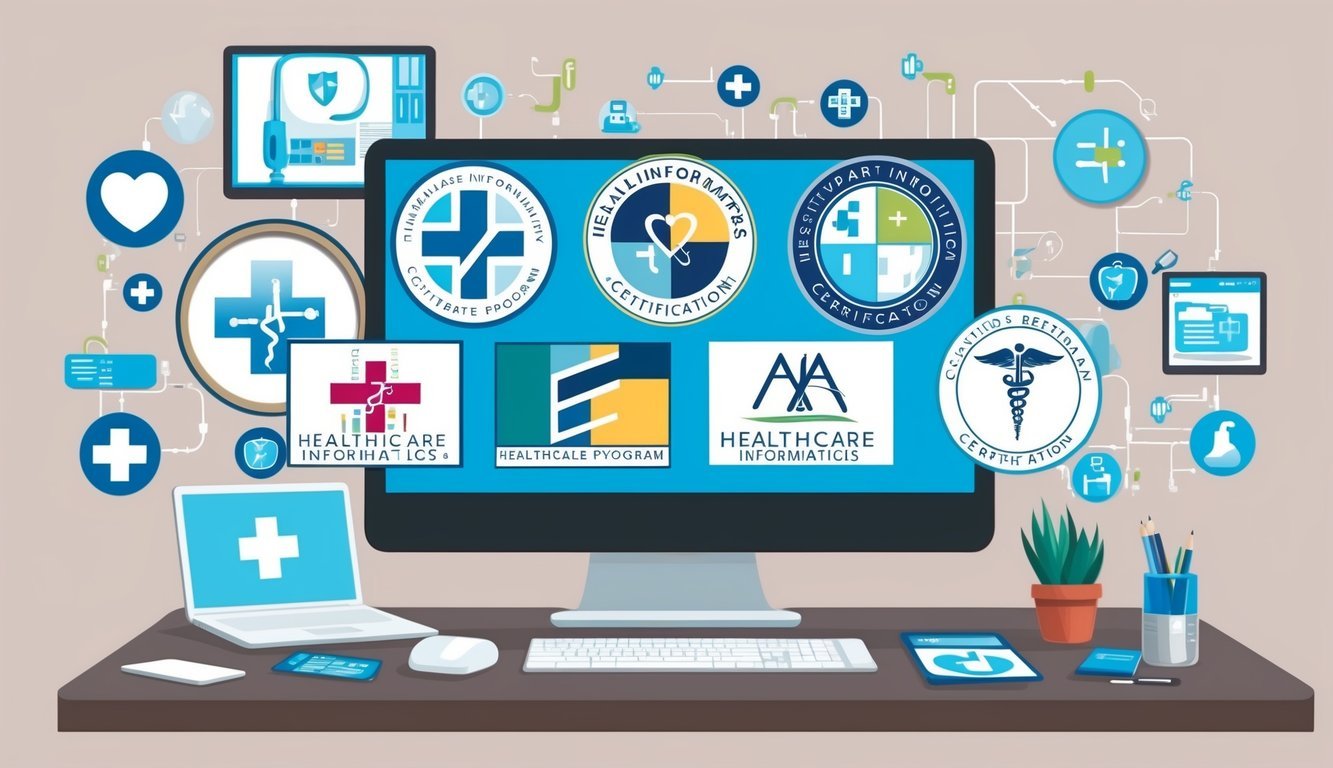
If you’re considering a career jump, getting certified can really set you apart. Health informatics certificates can help you shine brighter in the job market and signal to employers that you mean business. Ready? Here are some stellar programs to look into.
1) Certified Health Data Analyst (CHDA)
Want to flex those healthcare data muscles? The Certified Health Data Analyst (CHDA) program is your ticket.
This certification tells employers you know how to work with healthcare numbers like a pro.
To jump in, you’ll need at least three years of real-world experience with healthcare data.
You should be comfortable with data analysis and reporting, and if you find numbers exhilarating, you’re in the right place!
Thinking of taking the plunge? The exam might be a bit daunting at 3.5 hours long with 130 to 160 questions, but fear not! There are study materials to get you ready.
The exam covers a broad range, from health data sources to research methods and governance—it’s a comprehensive check on your skills.
Getting your CHDA can really open some doors in the healthcare industry, proving you can tackle the growing field of healthcare analytics with ease.
2) Registered Health Information Administrator (RHIA)
Ready to elevate your healthcare IT career? The RHIA certification is a solid choice.
Think of RHIAs as the essential connectors between healthcare providers, patients, and insurance companies.
They’re the savvy experts in medical, administrative, ethical, and legal aspects of healthcare.
You’ll dive into privacy and security practices—so important in our digital age.
Plus, you’ll learn all about healthcare laws and regulations.
To pursue this path, you’ll need a bachelor’s degree in health information management from an accredited program.
After that, gear up for an exam covering everything from data analysis to healthcare systems.
With an RHIA certification, you can work in various environments, whether it’s hospitals, clinics, or even remotely.
As healthcare goes digital, you’ll be in high demand!
3) Certified Professional in Health Informatics (CPHI)
Looking to power up your career? The Certified Professional in Health Informatics (CPHI) might just be your next step.
This certification showcases your ability to blend health data with technology.
If you’re already working in health information systems, this is the perfect credential to prove you can connect the dots between IT and healthcare providers.
To get certified, you’ll tackle an exam covering topics from health data standards to privacy laws and system design.
And yes, there are study guides and practice tests to help you gear up.
A CPHI will definitely get you noticed by employers.
It demonstrates your readiness to take on new challenges and shows you’re serious about your career in informatics.
Plus, it can lead to some pretty exciting job opportunities!
4) Health Informatics Graduate Certificate

Want to add some tech skills to your healthcare toolkit? A Health Informatics Graduate Certificate might be just what you’re after.
These programs are all about harnessing data and technology in healthcare settings.
Check out the Health Informatics Certificate at Northwestern University.
You’ll explore health data systems and analysis—perfect if you’re already in healthcare and looking to elevate your tech know-how.
Another great option is the Health Informatics Specialization from Johns Hopkins University on Coursera.
It’s an online program that covers the essentials of health IT, and you can learn at your own pace.
As convenient as your favorite Netflix binge!
If you’re near Charlotte, check out the Graduate Certificate in Health Informatics and Analytics at UNC Charlotte.
This 15-credit program digs deep into health data and its applications.
Going through these courses will not only improve your skill set but also help you stand out in an increasingly digital healthcare landscape.
5) Certified in Healthcare Data Analytics (CHDA)
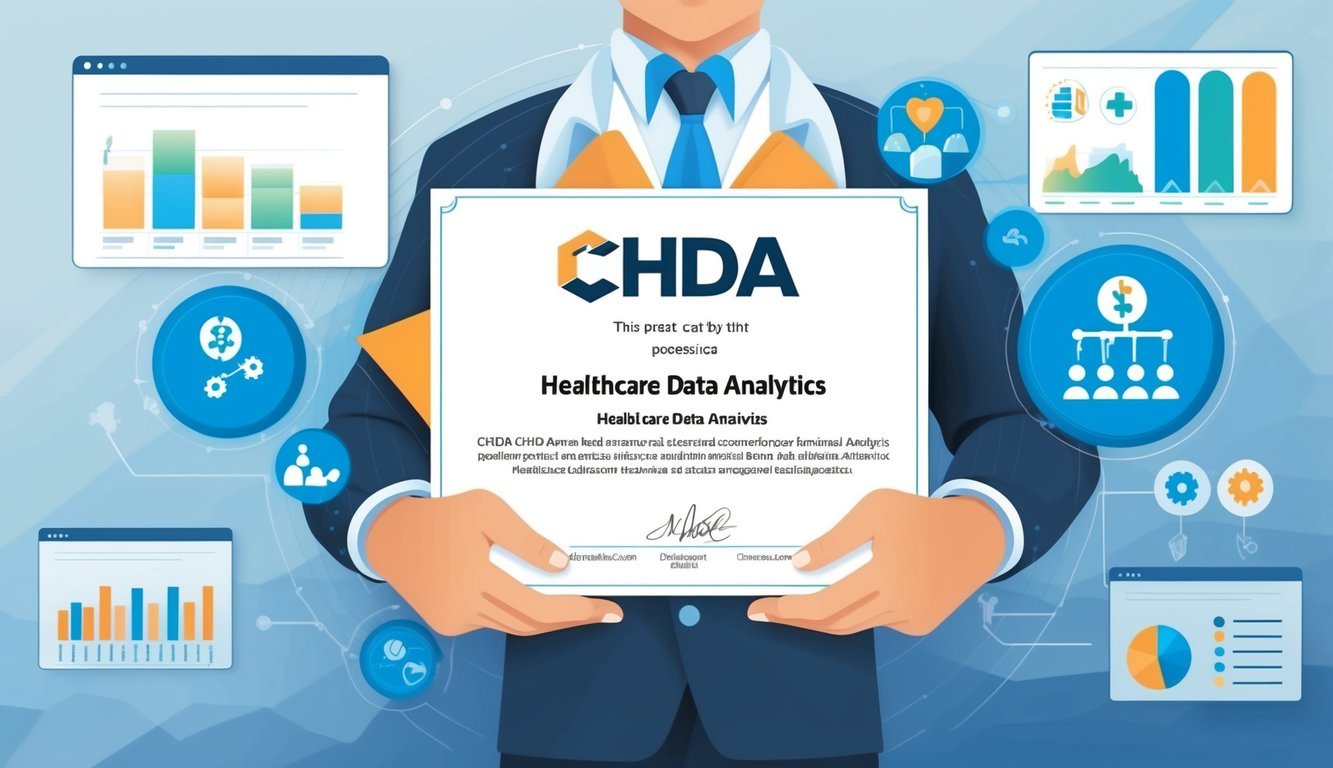
Want to become a data mastermind in healthcare? The Certified Health Data Analyst (CHDA) can help you do just that.
This program is all about turning healthcare data into meaningful insights.
Like the previous CHDA, you’ll need a few years of experience under your belt to qualify, focusing on data collection, analysis, and reporting.
The exam is comprehensive, covering everything from data management to interpretation.
But don’t sweat it; study materials are at your fingertips.
Once you ace that exam, you’ll join a league of professionals ready to tackle complex data challenges in healthcare.
This certification can unlock exciting roles in hospitals, research, and health tech companies.
Ready to take your data skills to the next level? The CHDA could just be your ticket to becoming a healthcare data superstar.
Remember, with great data comes great responsibility!
Understanding Healthcare Informatics
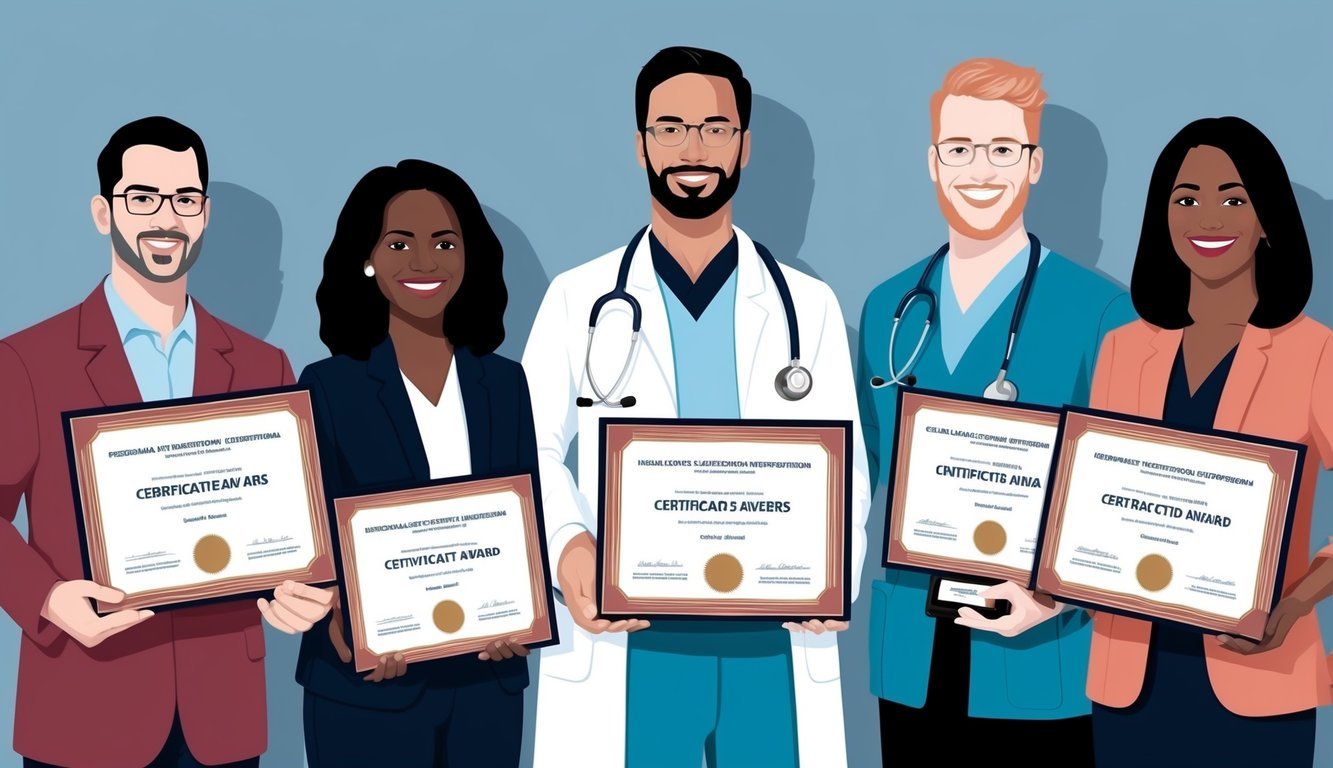
Healthcare informatics is that sweet spot where medical knowledge meets tech skills, all aimed at boosting patient care.
It uses data to make healthcare more efficient.
If you’re interested in this field, you’ll want a good grasp of both medicine and tech.
Role in Modern Medicine
In today’s medical world, healthcare informatics is a game changer.
It enables doctors and nurses to access patient information swiftly, aiding their treatment decisions.
Take electronic health records—these keep all your medical details organized in one spot.
Doctors can see your medical history, allergies, and medications in a heartbeat, helping avoid mistakes and ensuring better care.
Informatics also helps track health trends, pinpointing where help is needed most.
This intelligence guides public health policy and may even predict outbreaks.
Pretty nifty, right?
Essential Skills for Professionals
If you’re keen on healthcare informatics, you’ll need a unique mix of skills, combining medicine and tech know-how.
A solid grasp of computers is essential.
Here’s a checklist of key skills to develop:
• Data analysis • Basic programming • Understanding of medical terminology • Problem-solving • Strong communication
These skills are crucial for anyone eager to excel in the healthcare and medical coding arenas.
Interested in leveling up? Taking some of the best medical coding courses can strengthen your expertise and keep you in touch with industry standards.
Strong skills mean better accuracy in managing medical data and coding processes.
And don’t forget about catching up on AI and data science! These are transforming healthcare as we know it.
You’ll also want to stay informed about privacy laws like HIPAA because keeping patient information safe is crucial.
Being able to translate IT jargon into everyday language for doctors and nurses is key.
You’re the bridge between tech and healthcare.
Get those communication skills sharpened!
Benefits of Certification
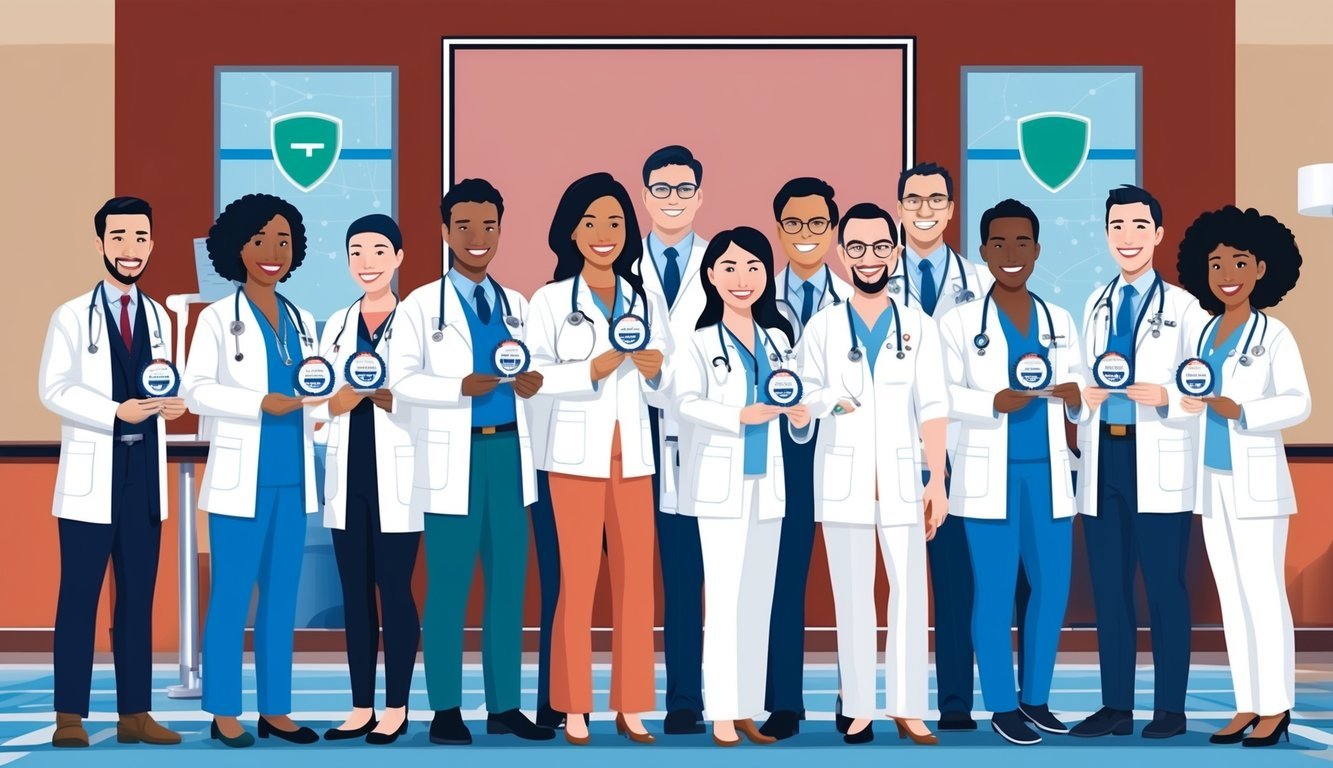
Getting certified in healthcare informatics can seriously crank up your career and enhance your skills.
It’s like a badge of honor for employers, signaling that you’ve got what it takes.
Career Advancement
Want to move up in your healthcare IT career? Certification can unlock new opportunities.
Many employers prioritize certified professionals when hiring or filling promotions.
With a CPHIMS certification, you might find yourself climbing the management ladder faster.
Plus, certified pros often see a bump in their earnings.
Your paycheck could get a nice boost as you demonstrate your expertise.
And let’s face it—certifications make you more attractive to potential employers.
Networking becomes a breeze once you’re certified.
You join a community of skilled professionals, opening doors to cool job offers and engaging projects.
Enhanced Knowledge and Skills
Going through certification prep deepens your understanding of healthcare IT.
You’ll grasp the latest trends and best practices, keeping you sharp in such a fast-paced field.
Programs like AHIMA certifications cover a wide spectrum of topics.
You’ll gain valuable skills in data analytics, privacy laws, and tech systems, making you a huge asset in your workplace.
Many certification programs offer hands-on practice.
You’ll tackle real-world problems that boost your confidence—because who doesn’t love practical experience?
And remember, staying certified means keeping up with industry changes.
Continuous learning is essential to adapt swiftly to new tools and methods.
Frequently Asked Questions
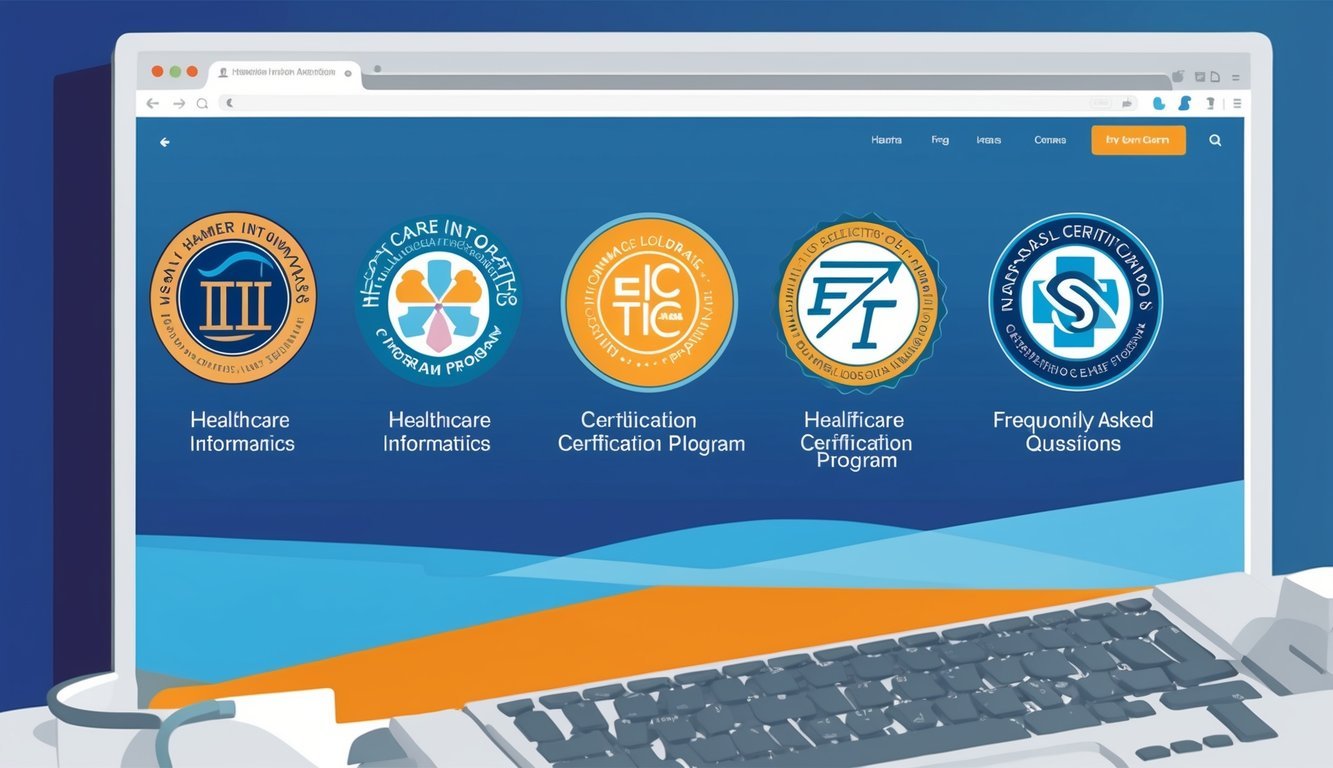
If you’re considering health informatics certifications, you’re not alone—many professionals ask about the best programs and requirements.
What certifications do you need for a career in health informatics?
While certifications aren’t always required, they can give you an edge.
Popular choices include the Certified Health Data Analyst (CHDA) and Registered Health Information Administrator (RHIA).
These credentials prove to employers that you possess specialized knowledge and skills.
Is investing in a health informatics certificate a good move for career advancement?
Absolutely! A certificate like the Certified Professional in Health Informatics (CPHI) can definitely open up new job doors.
Plus, it’ll help you stay current with the latest healthcare technology trends.
What’s the potential salary range for professionals in the health informatics field?
Salaries can vary widely based on experience and location.
Entry-level positions might kick off around $50,000 per year, while senior roles can reach over $100,000 annually.
And, you guessed it—certifications often lead to higher pay.
Which degree is most often pursued by health informatics specialists?
Most professionals opt for a bachelor’s degree in health information management or computer science.
Some even go the extra mile to earn a Health Informatics Graduate Certificate.
A master’s degree can pave the way for more advanced roles and higher salaries.
Can you recommend some top-rated programs for health informatics certifications?
Absolutely! The Health Informatics Specialization by Johns Hopkins University on Coursera is highly regarded.
Another strong contender is the Certified in Healthcare Data Analytics (CHDA) from AHIMA.
These programs cover vital topics and are recognized throughout the industry.
Are there any cost-effective options for obtaining a health informatics certificate online?
You bet! Online programs can be a more budget-friendly option.
For instance, Coursera offers a Health Informatics for Healthcare Professionals course that won’t break the bank.
Some universities also provide online certificates at lower costs compared to full degree programs.

